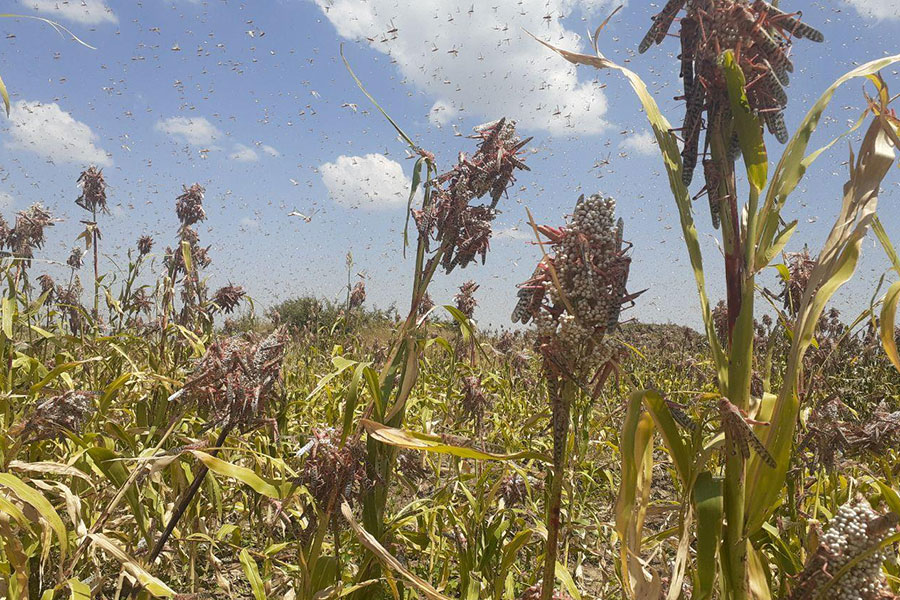
Verbatim | May 04,2019
Nov 25 , 2023
By Hippolyte Fofack
Ethiopia has long suffered from recurrent large-scale famines, most notably in the early 1980s, when at least one million people died and millions more were displaced. This year, however, Ethiopia has become a net wheat exporter for the first time, an extraordinary feat given its vulnerability to climate change and food-security crises.
While many factors contributed to this accomplishment, it mainly reflects the central role that new technologies have played in transforming Ethiopia's agricultural sector. By boosting crop yields and building resilience to extreme weather, these innovations have proven particularly helpful in regions facing worsening droughts and other climate risks. The Technologies for African Agricultural Transformation (TAAT) program, established by the International Fertiliser Development Centre, has been instrumental in deploying proven and high-performance agricultural technologies at scale, to help farmers increase the production of millet, maise, rice, wheat, and other staples.
As a result of the yield-increasing performance of these technologies, the area allocated to heat-tolerant wheat varieties in Ethiopia has grown from 5,000hct in 2018 to more than 2.2 million hectares in 2023, putting the country on the path to food self-sufficiency.
The "polycrisis" world of increasingly volatile global supply chains has accelerated the drive toward greater self-reliance. The war in Ukraine triggered a surge in food prices in Africa, with the wheat sub-index, for example, reaching a multiyear high in May 2022. Ethiopia was hit particularly hard because it imported almost half of its wheat from Russia and Ukraine. Now, the continent is reeling from the export ban that India, the world's largest rice exporter, recently imposed on several varieties.
Amid this challenging environment, the Ethiopian government's remarkable ability to use technology to boost domestic production and to reduce the risks associated with over-reliance on food imports may well represent a breakthrough. Such progress, especially in a country that was an agricultural basket case for several humiliating decades, offers hope for Africa, which has been on the frontline of the climate crisis, with food insecurity often fueling political unrest.
Consider, for example, that cereal yields in Africa have stagnated at 1,589Kg per hectare, far below the global average of 4,153Kg. There are many reasons for this, but the chronic technological deficit is the chief. The lack of agro-processing and high-value-added industries is another longstanding hurdle to increasing agricultural output and productivity growth on the continent. It has also exacerbated post-harvest losses estimated at about 30pc to 50pc of total food production in Africa.
Compounding the problem is the limited use of fertiliser on the continent and excessive dependence on rainfed agriculture. At around 7.6 million metric tons in 2021, fertiliser use is far lower than in East Asia (61.9 million metric tons) and South Asia (38.7 million metric tons), while the dearth of irrigation systems and other water-management tools is especially worrisome in light of the accelerating pace of global warming. These shortcomings have precipitated a rise in extreme hunger, with many communities on the continent facing the worst food crisis in 40 years.
But, the consequences of geopolitical upheaval and intensifying climate risks extend beyond food security, creating a vicious cycle of droughts, floods, macroeconomic instability, and balance-of-payments crises across the continent. Around 85pc of the food in sub-Saharan Africa (SSA) is imported, largely owing to the region's weather-sensitive agriculture. The continent now spends around 75 billion dollars annually on cereal imports, depleting foreign exchange reserves and increasing exchange-rate pressures.
Most African currencies depreciated sharply in 2022, with the Birr growing especially weak. This import dependence negatively affects the balance of payments, with increasingly frequent global supply shocks exacerbating the region's vulnerability.
Africa's food import bill is set to rise dramatically in the coming years, partly because of geopolitically induced shocks and projected population growth. But global warming will also fuel this surge. According to the Global Climate Risk Index, five of the 10 countries most affected by climate change in 2019 were in sub-Saharan Africa, where one-third of the world's droughts occur but less than one percent of arable land is equipped with irrigation.
The World Bank estimates that if global temperatures rise to 2° Celsius above pre-industrial levels by 2050, crop production in sub-Saharan Africa will decrease by 10pc.
Such a gloomy prediction may well come true. This year is on track to be the hottest on record, around 1.4°C above pre-industrial average temperatures. Climate models predict an additional 4°C of warming during this century if greenhouse gas emissions continue to rise at current rates. The need for greater investment in climate mitigation and adaptation has never been more apparent.
Faced with over-reliance on food imports and daunting climate forecasts, Africa must move away from the traditional rainfed model of agricultural production. Following Ethiopia's lead, the continent should embrace technology to boost agricultural productivity and improve food security. This will require aggressive investment in precision-agriculture technologies, such as variable-rate irrigation, that maximise productivity in a resource-constrained environment.
In addition to water-saving innovations, policymakers should invest in high-yield seed varieties that perform well under dry conditions and in agricultural equipment to mechanise the sector. Improved infrastructure, including solar-powered irrigation systems and digital technologies that allow farmers to access early-warning systems and improve efficiency, will also be essential.
Deploying a wide range of technologies to transform Africa's agriculture sector will address food security concerns as well as environmental and sustainability issues. Such a move is long overdue: even though Africa is home to more than 60pc of the world's uncultivated arable land, it has yet to benefit from the green revolution that has boosted yields elsewhere. The harsh realities of climate change and geopolitical upheaval may finally create sufficiently strong incentives to unlock the continent's potential and ensure greater self-sufficiency and resilience in food production.
This article is provided by Project Syndicate (PS).
PUBLISHED ON
Nov 25,2023 [ VOL
24 , NO
1230]


Verbatim | May 04,2019

Radar |

Fortune News | Dec 28,2019

Commentaries | May 31,2020

Agenda | Oct 17,2020

Viewpoints | Jul 30,2022

My Opinion | Apr 20,2024

Commentaries | Dec 07,2019


Commentaries | Oct 30,2021

My Opinion | 131974 Views | Aug 14,2021

My Opinion | 128363 Views | Aug 21,2021

My Opinion | 126301 Views | Sep 10,2021

My Opinion | 123915 Views | Aug 07,2021

Dec 22 , 2024 . By TIZITA SHEWAFERAW
Charged with transforming colossal state-owned enterprises into modern and competitiv...

Aug 18 , 2024 . By AKSAH ITALO
Although predictable Yonas Zerihun's job in the ride-hailing service is not immune to...

Jul 28 , 2024 . By TIZITA SHEWAFERAW
Unhabitual, perhaps too many, Samuel Gebreyohannes, 38, used to occasionally enjoy a couple of beers at breakfast. However, he recently swit...

Jul 13 , 2024 . By AKSAH ITALO
Investors who rely on tractors, trucks, and field vehicles for commuting, transporting commodities, and f...

Jul 5 , 2025
Six years ago, Ethiopia was the darling of international liberal commentators. A year...

Jun 28 , 2025
Meseret Damtie, the assertive auditor general, has never been shy about naming names...

Jun 21 , 2025
A well-worn adage says, “Budget is not destiny, but it is direction.” Examining t...

Jun 14 , 2025
Yet again, the Horn of Africa is bracing for trouble. A region already frayed by wars...

Jul 6 , 2025 . By BEZAWIT HULUAGER
The federal legislature gave Prime Minister Abiy Ahmed (PhD) what he wanted: a 1.9 tr...

Jul 6 , 2025 . By YITBAREK GETACHEW
In a city rising skyward at breakneck speed, a reckoning has arrived. Authorities in...

Jul 6 , 2025 . By NAHOM AYELE
A landmark directive from the Ministry of Finance signals a paradigm shift in the cou...

Jul 6 , 2025 . By NAHOM AYELE
Awash Bank has announced plans to establish a dedicated investment banking subsidiary...